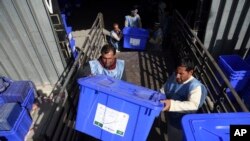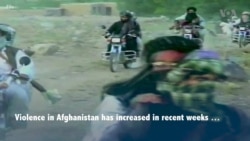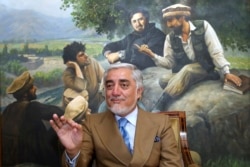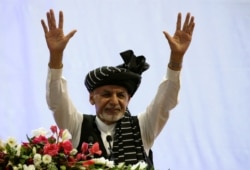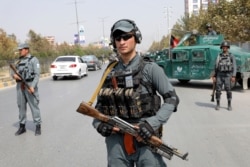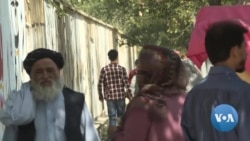VOA’s Zabihullah Ghazi from Nangarhar, Sayed Zairmal Hashemi from Kabul contributed to this report. Some of the information in this report came from The Associated Press.
WASHINGTON — Afghanistan is bracing for possible violence ahead of Saturday’s presidential election.
Amid an effectively stalemated war and postponed U.S. peace talks with the Taliban, the insurgents are threatening to attack polling stations, and some political candidates, concerned about potential fraud, are threatening violence if elections are not considered fair and transparent.
This is the fourth presidential election in Afghanistan since 2001, when the U.S.-led coalition toppled the former Taliban regime for harboring within its borders the al-Qaida militants who carried out the September 11, 2001, terror attacks on the United States.
The insurgent group has since viewed the Western-backed Afghan government as a “puppet regime” and have been engaged in a bloody insurgency against it that claimed tens of thousands of lives, mostly civilians.
The Taliban have vowed to disrupt the elections during the campaign season and Thursday once again threatened voters to stay away from polling centers.
The group has claimed responsibility for several deadly attacks in recent weeks across the country, targeting rallies and voter registration centers, killing and injuring dozens of people mostly civilians.
“The Islamic Emirate directs its Mujahideen to prevent this process throughout the country by making use of everything at their disposal and activate their plans for its neutralization,” a Taliban statement read.
Meanwhile, in an interview with The Associated Press this week, Gulbuddin Hekmatyar, a former U.S.-designated global terrorist and now a presidential candidate in the elections, warned of violence if Saturday’s polls are fraudulent.
“The situation will spiral out of everyone’s control and neither the government nor the foreign forces will be able to bring a halt to it,” he told The Associated Press, without elaborating.
He gave a more blatant warning while speaking to his supporters during a rally in Kabul this week.
“Do not make us regret our return, do not make us regret entering (the) election, do not make us use other means, we can do it and we have experience of it as well,” Hekmatyar said.
Hekmatyar later softened his tone during a presidential debate arranged by Tolo TV, the country’s largest private television station, following condemnation by United Nations that urged all parties to avoid attacking polling centers and civilians participating in elections, charging the actions would amount to war crimes.
“In regards to fraud, I believe fraud would take place. Plans have been laid out for large-scale fraud. We have invited everyone to use election as a means to resolve the current crisis of the country,” Hekmatyar said.
“Unfortunately, they did not listen to us enough, both internal stakeholders and external stakeholders. I did not say that we would go back to our stronghold [war]. We simply said do not push us to go back to the stronghold,” he added.
Hekmatyar has accused the front-runner and incumbent President Ashraf Ghani of abusing his power to win another term, an accusation the Afghan government has rejected.
Hekmatyar said if elections are transparent, his team would win, citing his election rallies around the country in recent weeks that according to him had attracted thousands of his supporters.
Dr. Abdullah Abdullah, President Ghani’s partner in the unity government and his main rival in the elections also warned that people would not accept fraudulent elections.
“We all are concerned about potential fraudulent elections and we all have the will and resolve to prevent fraudulent elections,” Abdullah said during Wednesday’s presidential debate.
“If they resort to fraud [in the elections] they would be responsible for the consequences of another fraudulent elections which could come at the expense the sacrifices of the Afghan people,” Abdullah added.
All winners
All major candidates, including the incumbent president, have shown confidence that they would win the elections.
In an interview with the U.S.-funded Radio Free Europe/Radio Liberty’s Afghanistan service, President Ghani said Wednesday that he is hopeful he would win the election during the first round.
“My prediction is that we will win during the first round if God willing ... but that decision rests with the people of Afghanistan,” Ghani said.
He did, however, say that this time around Afghanistan would have only one leader rejecting the idea of a potential coalition government.
“Afghanistan would have one president this time not two. The national unity government would not be acceptable anymore. … There is no risk of civil war the country’s security forces are completely apolitical and are ready to enforce the law. The risks that existed then [2014] do not exist anymore,” he added.
Following the 2014 presidential elections, the U.S. had to intervene and persuade Ghani and Abdullah to agree to the formation of unity government after both sides claimed victory and accused the other side of committing massive fraud. The contested elections then took the country almost to the brink of civil war.
Election commission
Hawa Alam Nuristani, chairperson of Afghan Independent Election Commission (IEC), defended the work of her institution and insisted that no one from the government has interfered in the election.
“As of yet, none of the [national unity government] leaders have interfered in our internal affairs of the commission, which I am leading and I fully assure the people of Afghanistan about this,” Nuristani told VOA.
She insisted that it is impossible for fraud to take place because they have taken all the necessary measures.
“Though we have taken extraordinary measure to prevent electoral fraud, with this technology [biometric devices] electoral fraud is impossible. To ensure legitimacy, however, we have invited international observers including all Kabul-based embassies to oversight the election process. We welcome all international observers,” she added.
Armed supporters
Some experts are warning that with many of the key players involved in the election having armed supporters, the prospects for violence are high.
“I think it’s all but inevitable that there will be fraud and that the result will be contested. And because so many key players have armed supporters, violence prospects will be high,” Michael Kugelman, deputy director and senior associate for South Asia Program at the Washington-based Woodrow Wilson center, told VOA.
“With long-standing political divides exacerbated by a national unity government that proved quite unpopular, the environment will be quite tense. And that heightens the risk of the election result being contested, as well as the risk of political unrest and additional violence perpetrated by militants seeking to exploit the situation. It could get very messy,” Kugelman added.
Locals’ reactions
Yet, voters seem determined to vote, hoping it could end the country’s 18-year-long conflict.
“I will vote because we are tired of war and distress. We cannot continue our lives this way. We want the war to end,” Dost Mohammad, a resident of Ghazni province told VOA.
Saeeda Ahmadi, a resident of the capital, Kabul, said she recognizes the threats and the possibility of fraud, but insisted that voting is her civic duty.
“I think if I go to vote, chances are that I might not return home alive,” she said.
“I would participate in the elections despite all the problems and the shortcomings. … I think if voters observe irregularities they should raise their voices and inform authorities,” she added.
Mohammad Laiq, a resident of eastern Kunar province, urged the election commission to remain neutral and transparent.
“I have decided to go to polling center and cast my vote along with my family. If they compromise on our votes, people would lose confidence and not show up for the next elections,” Laiq said.
Masihullah Nasrat, a resident of Kabul, told VOA that he does not want another unity government this time.
“We do not want a unity government again where we would have two leaders. No other country has had such a government. Our concern is that God forbid we would have to deal with a similar arrangement again,” Nasrat said.
“As far as security goes, threats are there, but these threats cannot stop us from voting. We will vote,” he added.




